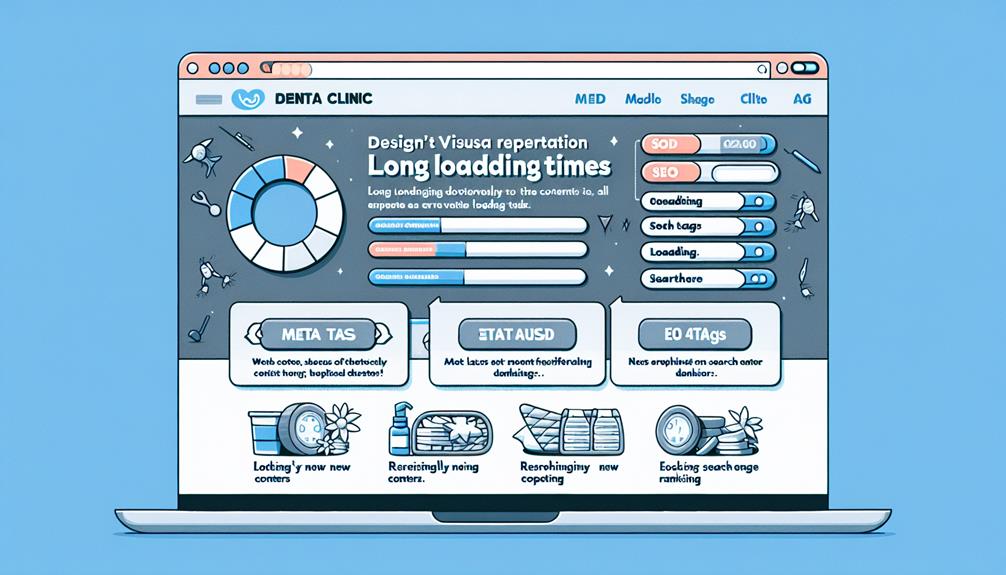When it comes to enhancing your dental practice’s online presence, there are a few missteps that are best avoided.
Ensuring your website ranks well on search engines is crucial for attracting new patients and staying competitive in the digital landscape.
From optimizing your content to fine-tuning technical aspects, there are key SEO pitfalls that dentists need to sidestep to make the most of their online visibility.
By steering clear of these common errors, you can position your practice for success in the ever-evolving world of digital marketing.
Keyword Stuffing
Avoid falling into the trap of keyword stuffing when optimizing your dental website, as it can harm your SEO efforts rather than boost them. Content relevance is key when it comes to SEO optimization. Instead of cramming keywords unnaturally into your content, focus on creating high-quality, relevant material that provides value to your visitors. Search engines prioritize content that’s informative and engaging, so ensure that your keywords flow naturally within your text.
User experience plays a crucial role in SEO success. By stuffing keywords excessively, you risk creating a poor user experience for those visiting your site. Visitors may find the content awkward to read and may leave your website quickly, increasing your bounce rate. Instead, aim to strike a balance between incorporating keywords strategically and maintaining a seamless user experience.
Ignoring Local SEO
Neglecting the optimization of your dental practice for local search can severely hinder your online visibility and potential patient reach. To enhance your local SEO, start by ensuring your practice is listed on relevant local directories. Listings on platforms like Google My Business profile can significantly boost your visibility in local searches.
Additionally, optimizing your website with local citation – mentions of your business name, address, and phone number – can further establish your practice’s local presence.
On-page optimization is crucial for local SEO. Make sure your website includes location-specific keywords, meta tags, and content. Utilize schema markup to provide search engines with detailed information about your practice’s location and services. Off-page optimization strategies like building quality backlinks from local websites can also improve your local search rankings.
Neglecting Mobile Optimization
Utilize responsive design techniques to ensure your dental practice’s website is fully optimized for mobile devices, enhancing user experience and boosting your online visibility. In today’s digital landscape, mobile responsiveness is crucial for attracting and retaining patients. Neglecting mobile optimization can lead to a poor user experience, lower search engine rankings, and ultimately, a loss of potential clients.
To avoid this pitfall, consider the following strategic steps:
- Implement Responsive Design: Ensure your website adapts seamlessly to various screen sizes.
- Optimize Loading Speed: Compress images and minimize code to enhance mobile performance.
- Prioritize Mobile-Friendly Content: Use clear fonts, concise information, and easy navigation.
- Enable Click-to-Call Functionality: Make it simple for users to contact your practice directly.
- Utilize Local SEO Strategies: Enhance your mobile presence by optimizing for local search terms.
Overlooking Content Quality
When it comes to your dental website, stuffing your content with keywords may seem like a quick win for SEO, but it can actually harm your rankings and user experience. By overlooking the quality of your content and focusing solely on keyword density, you risk losing the trust of visitors and search engines alike.
Keyword Stuffing Risks
Avoid compromising the quality of your content by excessively stuffing keywords, as this can harm your website’s visibility and credibility in search engine results. When it comes to keyword stuffing risks, remember the following:
- Decreased Readability: Excessive keywords can make your content difficult to read and understand.
- Negative User Experience: Visitors may perceive your content as spammy or low-quality.
- SEO Penalties: Search engines penalize websites that engage in keyword stuffing practices.
- Loss of Trust: Users may lose trust in your site if they feel bombarded with keywords.
- Diminished Conversion Rates: Keyword stuffing can deter potential patients from engaging with your content or services.
To maintain a strong online presence and reputation, focus on providing valuable, natural content that resonates with your audience.
Neglecting User Intent
Neglecting user intent can significantly impact your website’s performance and overall success in attracting potential patients to your dental practice. Understanding user behavior, search intent, and user experience are crucial elements in creating quality content that resonates with your audience.
By overlooking these factors, you may miss out on opportunities to connect with individuals seeking dental services. User intent goes beyond just keywords; it delves into the reasons behind a user’s search query. By crafting content that aligns with what users are looking for and providing valuable information that meets their needs, you can enhance your website’s visibility and credibility.
Prioritizing user intent ensures that your website not only ranks well but also engages and converts visitors effectively.
Not Utilizing Metadata
You may be missing out on significant SEO opportunities by neglecting to utilize metadata effectively.
Optimizing title tags with relevant keywords can boost your website’s visibility and ranking on search engine results pages.
Additionally, incorporating descriptive image alt text can enhance the accessibility and relevance of your content for both users and search engines.
Importance of Metadata
Metadata plays a crucial role in optimizing your dental practice’s online visibility and helping potential patients find you easily on search engines. Neglecting metadata can significantly impact your search rankings and user experience.
To ensure you’re making the most of this essential element, consider the following:
- Metadata Strategy: Develop a comprehensive plan to incorporate relevant keywords and information.
- Search Rankings: Enhance your chances of appearing higher in search results by crafting descriptive metadata.
- Metadata Optimization: Regularly review and update your metadata to align with current best practices.
- User Experience: Provide users with accurate and compelling metadata to increase click-through rates.
- Visibility: Improve your practice’s online presence by utilizing metadata effectively.
Optimizing Title Tags
Transitioning from optimizing metadata to focusing on title tags is a pivotal step in enhancing your dental practice’s search engine visibility and attracting potential patients effectively.
When it comes to on-page optimization best practices and staying ahead of SEO trends, 2022 updates emphasize the importance of crafting compelling title tags. Your title tags should be concise, relevant, and include targeted keywords to improve your ranking on search engine results pages.
Incorporating your location and specialty can also help potential patients find you more easily. Remember, title tags are often the first thing users see in search results, so make them engaging to entice clicks.
Image Alt Text
When optimizing your website for search engines, ensuring proper utilization of image alt text is crucial for enhancing accessibility and boosting SEO performance. Image alt text provides valuable information to search engines about the content of images on your site.
Here are some key points to consider for optimizing your image alt text effectively:
- Describe the Image Accurately: Be descriptive and concise in your alt text to convey the image’s context.
- Incorporate Keywords: Use relevant keywords in your alt text to improve SEO.
- Avoid Keyword Stuffing: Keep your alt text natural and relevant to the image.
- Consider Accessibility: Alt text is vital for visually impaired users to understand your content.
- Maintain Brand Consistency: Use alt text to reinforce brand messaging and ensure consistency across social media platforms.
Skipping Regular Website Audits
Regular website audits are crucial for dentists to maintain a strong online presence and ensure their website is optimized for search engines. By skipping regular website audits, you risk missing out on valuable insights into your website performance and potential areas for improvement. Conducting regular audits allows you to identify technical issues that may be hindering your site’s visibility on search engines, such as slow loading times or broken links.
Moreover, regular website audits provide an opportunity for competitor analysis, enabling you to stay ahead of the competition in the digital space. By analyzing your competitors’ websites, you can gain valuable insights into their strategies and performance, allowing you to make informed decisions to enhance your own site.
In essence, skipping regular website audits can lead to missed opportunities for growth and improvement. Take the time to conduct thorough audits of your website to ensure that it remains optimized and competitive in the ever-evolving digital landscape.
Frequently Asked Questions
How Does Keyword Stuffing Impact a Dentist’s SEO Efforts?
Keyword stuffing negatively impacts your SEO efforts as a dentist. It violates SEO best practices, leading to penalties from search engines. Instead, focus on creating quality content with relevant keywords to improve your website’s ranking and visibility.
Why Is Local SEO Important for Dentists?
To boost your dental practice’s visibility, focus on local SEO. Claim and optimize your Google My Business listing, manage online reviews for a stellar reputation. Engage with local listings to attract more patients.
How Does Neglecting Mobile Optimization Affect a Dentist’s Online Visibility?
Neglecting mobile optimization can harm your online visibility. When your website lacks mobile responsiveness, users have a poor experience. Remember, in the online world, you need to cater to all devices to stand out.
Why Is Content Quality Crucial for a Dentist’s Website Ranking?
To boost your website’s ranking, focus on high-quality content. Engage users with valuable information and optimize for user experience. Incorporate link building strategies to establish credibility and authority in the eyes of search engines.
How Does Metadata Help Improve a Dentist’s SEO Strategy?
When it comes to improving your dentist website’s SEO strategy, metadata plays a crucial role. Crafting compelling title tags and descriptions, along with optimizing images for indexing, can boost your site’s visibility and attract more potential patients.
Conclusion
In conclusion, when it comes to SEO for dentists, avoiding common pitfalls is crucial for online success. By steering clear of keyword stuffing, prioritizing local SEO, optimizing for mobile, maintaining high-quality content, utilizing metadata, and conducting regular website audits, you can ensure your practice stands out in search results.
Remember, the early bird catches the worm – staying proactive and avoiding these pitfalls will help you attract more patients and grow your practice effectively.

Suraj Rana is a renowned Dental SEO Expert, deeply committed to elevating dental practices in the online landscape. With a profound understanding of technical SEO, he specializes in tailoring on-page optimization strategies specifically for the dental industry. Suraj’s extensive experience spans across various sectors, but his passion truly lies in transforming the digital presence of dental clinics. His expertise in dental-specific search engine optimization, combined with a data-driven approach, empowers him to develop strategies that significantly increase organic traffic, enhance search engine rankings for dental-related keywords, and ultimately drive business growth for his dental clients. Suraj Rana’s unique blend of SEO skills and dedication to the dental field make him an invaluable asset to any dental practice looking to thrive online.


